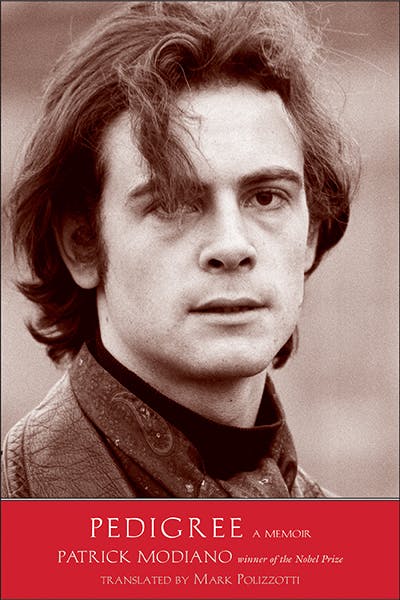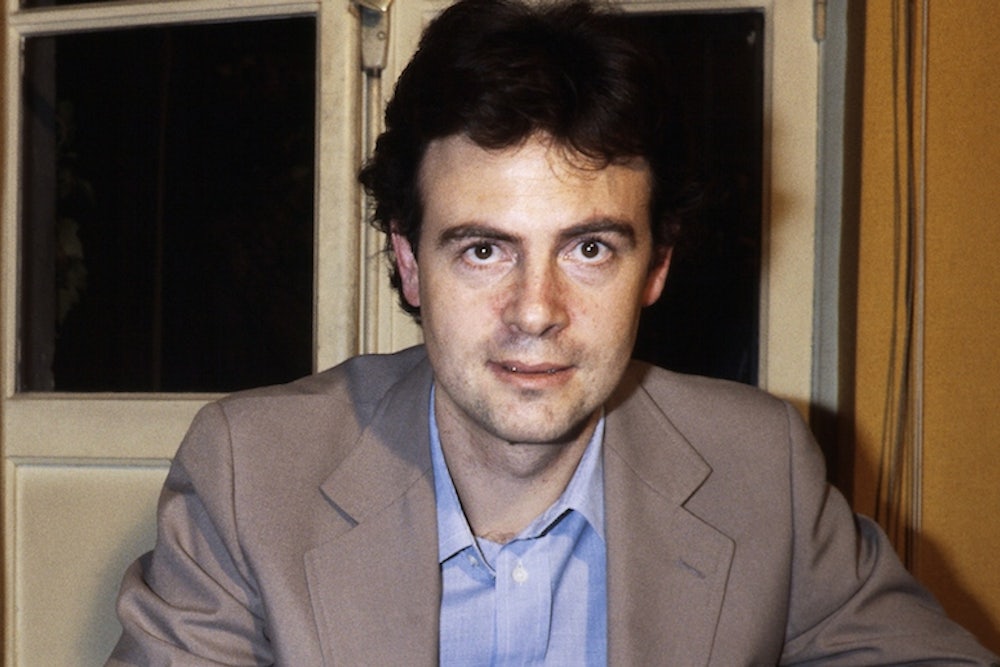If repetition is a common trait among prolific novelists, it is a vice that, as the historian Michael Wood has written, applies to Patrick Modiano “more than most.” The criticism one often hears of the French novelist—especially after his receipt of the Nobel Prize in October 2014—is that all his novels are the same. Over the course of a long career, beginning in 1968, Modiano has published more than 25 books. Short, stylized, staccato fictions, nearly all of them are variations on the theme of missing persons, either murdered in the German Occupation of France or adrift in its uncertain aftermath. Yet for one who has returned so frequently to the same subject, Modiano’s own story has remained somewhat elusive. What, after all, impels him to write the same book, time and time again?

Until the release of his memoir, now published in English, the details of Modiano’s life had remained selectively scattered throughout his work, present here and there but never compiled in a singular volume. An exception was his 1977 novel, Livret de la Famille, which contains a series of autobiographical sketches, albeit sketches that eschew a chronological narrative. Instead of recounting a story, his fiction tries to evoke what he calls “pre-history”: the world we came from but may not have known in any actual way, a dream-like past whose lack of reality creates a sense of distance in the present, sometimes even alienation.
Rootless and devoid of history, Modiano’s characters tend to reflect the way he sees himself. The opening line of his 1978 novel Rue des Boutiques Obscures is spoken by an amnesiac detective in search of his own past. “I am no one,” he confesses. “Nothing but a pale shape, silhouetted that evening against the café terrace, waiting for the rain to stop.” In a sense, this line is a distillation of Modiano’s entire oeuvre. If history is narrative—constructed, personal, inherited—then pre-history is the province of those without narrative. As Modiano put it: “Like everyone who has neither ground nor roots, I am obsessed by my prehistory.”
Who, then, is Patrick Modiano? His memoir Pedigree, originally published in France in 2005, is brief and sharp, a pointillist interpretation of personal history, a chronicle that resembles a mere list of names and places and dates that emphasizes, yet again, the question of pre-history. As its title suggests, the book is in part an homage to Georges Simenon’s Pedigree, the Belgian writer’s 1948 autobiographical novel “in which everything is true but nothing is accurate,” a natural inspiration for Modiano’s project. “I’m a dog who pretends to have a pedigree,” Modiano writes. “My mother and father didn’t belong to any particular milieu. So aimless were they, so unsettled, that I’m straining to find a few markers, a few beacons in this quicksand.”
Born in Paris in 1945, Modiano emerged from the wreckage of the Second World War, in a family formed by the vicissitudes of history. As he notes: “that’s the soil—or the dung from which I emerged.” His French-born father, Albert Modiano—with whom the young Patrick had a famously toxic relationship, recounted in Pedigree in considerable depth—was from a Sephardic Jewish family originally from Thessaloniki but with relations across the Mediterranean world, a number of whom were murdered in the Holocaust. By contrast, his Flemish mother, Louisa Colpeyn, a vain, would-be actress, finagled a way to be sent by the Germans to Paris, where she worked at Alfred Greven’s Continental Films, occupied France’s infamous Nazi-controlled film production company.
Although he was arrested and nearly deported in 1943, Albert Modiano did not wear the yellow star on his jacket—a spot his son would later refer to, in a play on the major Paris landmark, as “la place de l’étoile”—and never registered with the authorities as a Jew. In fact, he was active (and profitable) on the black market throughout the Occupation, even associating from time to time with certain members of Carlingue, French auxiliaries of the Gestapo. Albert ultimately served as a model for the anti-hero of Patrick’s first novel, Raphael Schlemilovitch, an anti-Semitic Jew who also belongs to the French Gestapo. After its publication in 1968, Modiano père allegedly attempted to buy up and destroy all the copies of his son’s book. This seemingly petulant act betrays a particularly traumatic family culture: even the histories the young writer imagined could be confiscated and denied.
In any case, Albert Modiano met Louisa Colpeyn in October 1942 at a party in Paris’s tony sixteenth arrondissement under the assumed name of a friend, Henri Lagroua. Years later, the young Patrick would be mystified to learn that some still knew his father this way and that Albert Modiano, as it were, had ceased to exist long ago. Even the fixity of a name—the personal stamp of history meant to persist long into the future—had turned out to be an illusion, a poetic license. “I’ve never felt like a legitimate son,” Modiano writes, “much less an heir.” An heir, after all, requires an inheritance.
Throughout the rest of his adolescence, Pedigree reveals, Modiano was characterized by a rootlessness that was not limited to his family life. His heritage was opaque, his parents absent, his sense of self in constant flux. He was in and out of schools, and, in a sense, he was in and out of lives, exiled from a way of being that he himself could not define.
For the most part, Pedigree is decidedly unpleasant to read: it lacks the narrative grace that characterizes the rest of Modiano’s prose, and it reads like a series of captions for a family scrapbook—a surrealist scrapbook, a Dadaist scrapbook, even, but a scrapbook nevertheless. Its contribution, however, is its illegibility, a stream of consciousness that borders on cacophony and eschews interpretation of either present or past.
There is no sense, after all, to be made of Modiano’s lived experience, a trajectory that, to some degree, mirrors French postwar experience. Modiano's birth coincided with the end of the war and he published his first novel in the fateful year of 1968, when his literary sensibility was sharpened by his country’s collective reckoning with decolonization abroad and, at home, the emerging memory of wartime collaboration, what the historian Henry Rousso would famously dub “le passé qui ne passe pas,” the past that will not pass.
Throughout his career, Modiano—always in search of his own past—would ultimately produce several of the seminal texts that evoke the “pre-history” of his own country, postwar France. Modiano wrote the script for Lacombe, Lucien, the director Louis Malle’s 1974 film about a peasant boy recruited into the Milice, and he is perhaps best known for his 1997 novel Dora Bruder, an elegy for one among the 76,000 Jews deported from France during the Holocaust. In the end, the novel is a detective story: the search for traces of a forgotten fifteen-year-old girl but really the search for the nature of a world that could permit, and, indeed, facilitate her disappearance.
In a sense, the so-called “années noires” of German Occupation and French complicity in the Holocaust are the pre-history of the nation established by Charles de Gaulle in the aftermath of the Second World War. As styled by de Gaulle himself, postwar France told itself it was a nation of resistors entirely removed from the legacy of Vichy. For a time, a deliberate amnesia suppressed the memory of what had happened just before the establishment of this new France in the zero hour of 1945. Thanks to his own experience of deracination, Patrick Modiano knows what it is to be denied history. On some level, his work is thus an attempt to ensure that the pre-history of contemporary French society will always be known—to the extent, of course, that it can be known.
One gets the sense that the book Modiano is constantly rewriting and the narrative he is continually refashioning are attempts to create some kind of structure in a void. If we feel we know Modiano’s stories—or, rather, story—we have missed the point. Using the same set of fragments—names, places, themes—each of his interpretations is ultimately an attempt at capturing the boundless possible permutations of the plus que parfait, the what might have been, the great unknown. Pedigree is a slim volume, but it is a list of the fragments Modiano uses, rearranges, and reimagines. Now the reader can join him in this enterprise, this voyage into pre-history.
